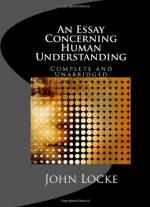|
This section contains 10,422 words (approx. 35 pages at 300 words per page) |

|
SOURCE: "Locke's Theory of Knowledge," in The Cambridge Companion to Locke, edited by Vere Chappell, Cambridge University Press, 1994, pp. 146-71.
In the following essay, Woolhouse examines Locke's view of the relationship between experience, ideas, and knowledge in An Essay Concerning Human Understanding, emphasizing Locke's rejection of the innatist conception of the origin of knowledge and "moral truths."
In the course of its considerable length the Essay concerning Human Understanding deals with many topics; but its main theme and concern is knowledge and the capacity of the human understanding to acquire it. "[M]y Purpose," Locke tells us, is "to enquire into the Original, Certainty, and Extent of humane Knowledge; together, with the Grounds and Degrees of Belief, Opinion, and Assent" (E I.i.2: 43). What is knowledge and how is it acquired? Are there any limits to what we can know and, therefore, things about which we can have...
|
This section contains 10,422 words (approx. 35 pages at 300 words per page) |

|


